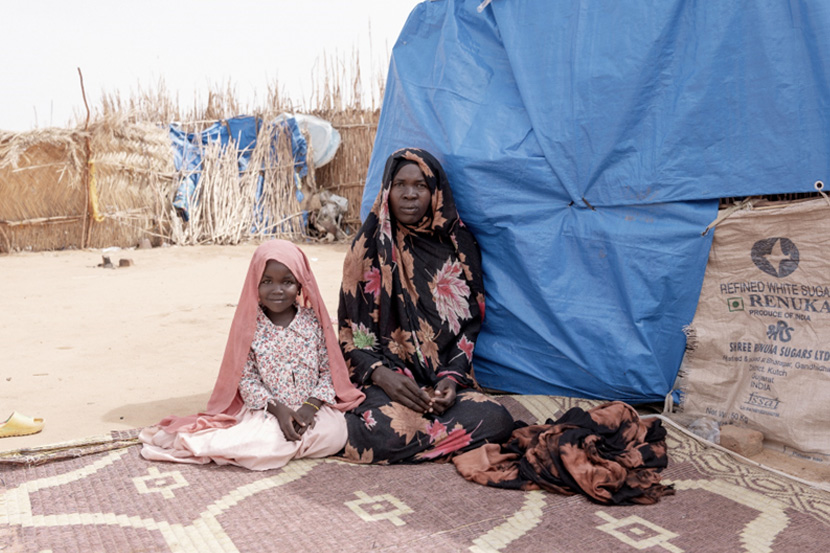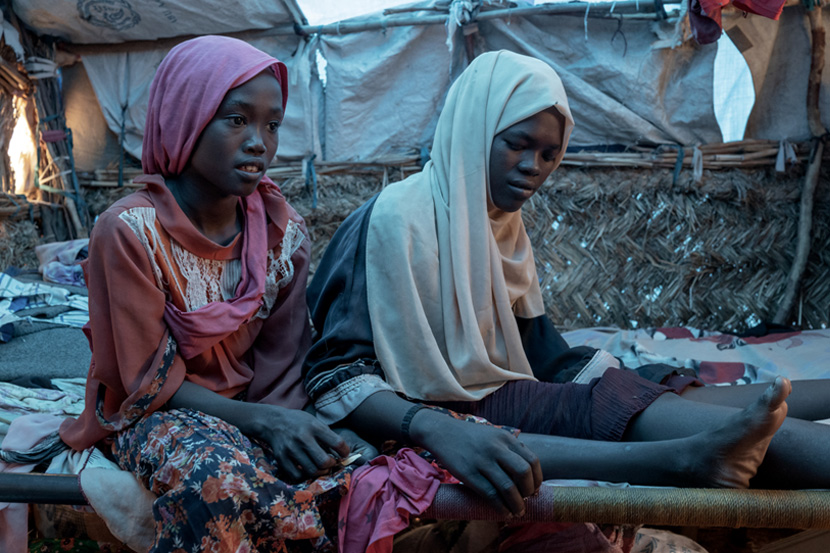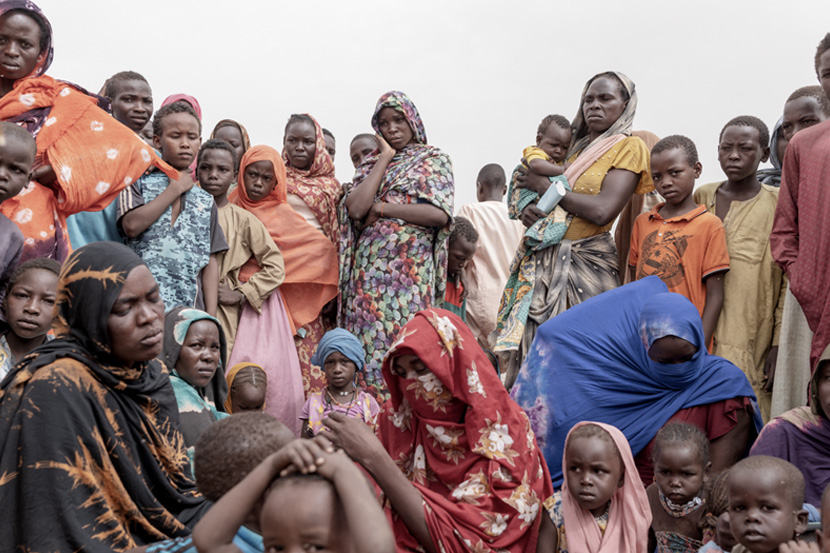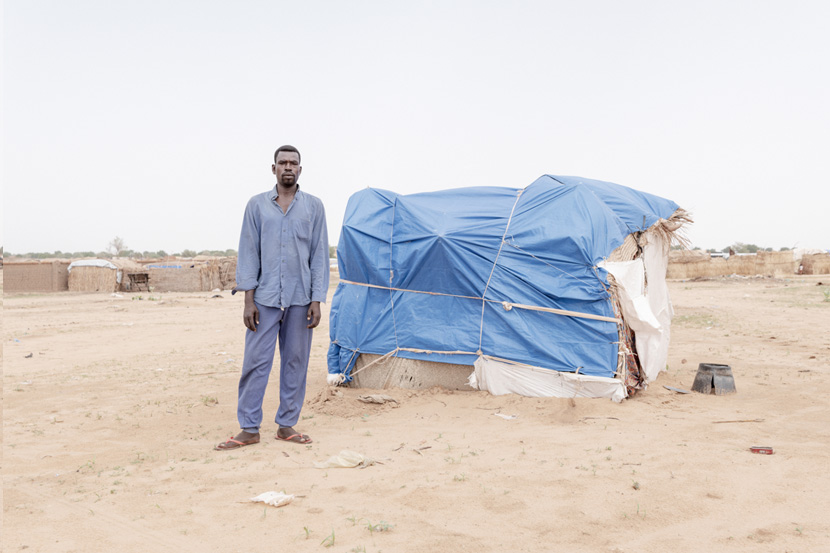Common mental health concerns like depression and anxiety are more prevalent in the Eastern Mediterranean Region than the global average
28 November 2024, Adre/Cairo – Masaadit was 4 when she walked with her mother and 7 siblings from Sudan’s Darfur to Adre in bordering Chad. By that age, she had walked over corpses, witnessed her 11-year-old brother shot and injured, and had not eaten enough in months.
“We came with very few belongings. Everything was gone when our house in the village of Abu Naima was burnt down, all around us people were killed and there was nothing to eat. We walked for a few days, walking over bodies on the way here,” her mother Aliya Noor says.
 Masaadit and her mother Aliya Noor who crossed from Darfur to Eastern Chad in June 2023. Photo: WHO/Nicolò Filippo Rosso
Masaadit and her mother Aliya Noor who crossed from Darfur to Eastern Chad in June 2023. Photo: WHO/Nicolò Filippo Rosso
A year after they moved, the journey still haunts the children. They are easily terrified, their mother says. “Every time it rains, or they hear a loud sound, my youngest children, Masaadit, Sajida (7) and Sana (9) get very scared and start crying.”
Aliya Noor’s family was displaced 3 times within Sudan, as they fled violence and moved from place to place. When the gathering site where they were seeking refuge in El Geneina, the capital of West Darfur, was attacked in June 2023, they crossed into Chad. Since then, home for this family of 9 has been a white plastic tent.

Aliya Noor’s eldest daughters, Mayad, 12, and Salima, 15, sit on a bed inside the makeshift home they built in the refugee camp in Adre, Chad. Photo: WHO/Nicolò Filippo Rosso
The war in Sudan has set off one of the world’s largest and most pressing protection and displacement crises, and the world’s largest hunger crisis.
The number of people displaced has grown exponentially since the outbreak of war in April 2023. Over 14 million people have been forced to flee their homes. More than 11.2 million are internally displaced and 3.2 million refugees and returnees have crossed borders to seek safety.
Aliya Noor's 11-year-old son was beaten by militia men on the way and shot in the foot. He immediately puts out his foot to show the scars when his mother tells the story. Behind him stands his 23-year-old brother who has old scars of a bullet on his shoulder. Twenty years ago, during the armed conflict in Darfur, he was shot in the shoulder when he was 3 years old.
The town of Adre in eastern Chad had a population of 40 000 before the war started in early 2023. Today, it is home to over 800 000 people. With the intensifying conflict in Darfur, an additional 25 000 people arrived in eastern Chad in the first week of October alone.
The most recent arrivals at the camp in Adre appear more visibly in need. One step into that side of the camp and people crowd around, asking for food. Among the new arrivals is a woman calling out, her speech incoherent even to bystanders, her face and hair appearing as if they have not been washed in months. “She has a mental problem,” people around her whisper. Nearby, another woman has come with her sisters: “We were hungry for months before we came,” she says.
 The town of Adre in eastern Chad had a population of 40 000 before the war started in early 2023. Today, it is home to over 800 000 people. Photo: WHO/Nicolò Filippo Rosso
The town of Adre in eastern Chad had a population of 40 000 before the war started in early 2023. Today, it is home to over 800 000 people. Photo: WHO/Nicolò Filippo Rosso
Stories of divided families are common in the camp. One woman, Khadija, approaches us upon hearing that a team is visiting from Egypt. "Have you seen my daughter?” she calls out.
Khadija’s daughter was studying in Khartoum when the conflict erupted in April 2023. Khadija had heard that her daughter fled to Egypt, but there is no other news since as to where she is. “Is there any way you can help me find her?” she asks.
Khadija’s 12-year-old son was shot during an attack on their home. The armed men also shot her husband. Both survived, but now her son clings to her, afraid to be alone. “Wherever I go, he goes. We saw many dead bodies on the way,” she says.
This is not the first time conflict has shattered Khadija’s life. In 2003, during the armed conflict in Darfur, her father and brother were killed. She reminisces about their pre-war life with longing: “It was a happy life. We grew our own fruit and vegetables – millet, watermelon, tomatoes. There was always enough to eat.”
 Mohammad Moosa Gibrael says memories of the 7 days he was in captivity in West Darfur continue to haunt him. Photo: WHO/Nicolò Filippo Rosso
Mohammad Moosa Gibrael says memories of the 7 days he was in captivity in West Darfur continue to haunt him. Photo: WHO/Nicolò Filippo Rosso
Nearby, Mohammad Moosa Gibrael takes out his most precious possession from his right pocket: a SIM card carefully wrapped in a black plastic bag. He sold his cell phone last year to make himself a makeshift shelter of blue and white plastic sheets.
The SIM card is his only link to his wife and children, who he has not seen in a year. When he finds someone with a phone, he inserts the SIM to call his family who sought refuge in another part of Chad to where there is no transportation. Gibrael was kidnapped for a week along with 7 friends in April of 2023 in West Darfur. “We were in Mornay when they released me after checking to see if we had any weapons. After release, they said run. And when I started running, they shot me in the back.”
Of the 7 friends taken with him, 5 remain unaccounted for. “They are not in the camp. I don’t know where they are,” he says. “Someone brought me here [from Mornay to the MSF health facility near the camp in Adre] for surgery. I would have died without it. Memories of those 7 days in captivity still haunt me.”
Addressing mental health needs is part of WHO's overall health response. It includes training frontline health workers with psychological awareness and compassionate listening skills, including in mobile clinics for internally displaced persons, in addition to the provision of psychotropic supplies, among other activities.
The mental health impact of the crisis is profound. Clear estimates for mental health needs within Sudan and among refugee populations remain difficult to ascertain. The scale of trauma is immense. People have witnessed mass killings, experienced sexual violence, and lost their homes, land and sense of agency.
Mental health specialists are scarce. Before April 2023, Sudan had 60 psychiatrists, according to the Ministry of Health. Now, only about 20 remain, equating to 1 psychiatrist per 2.5 million people. With shifting displacement figures, confirming this number and the functionality of services is challenging. In neighbouring countries hosting Sudanese refugees, such as Chad, there are reportedly no psychiatrists, and South Sudan is reported to have only 2.
Across the Eastern Mediterranean Region, there are fewer than 8 mental health professionals per 100 000 people, compared to the global average of 25 per 100 000. The shortage exacerbates an already dire situation in a Region burdened by conflict and prolonged humanitarian emergencies. Depression and anxiety are more prevalent in the Region than the global average, affecting 16% of the population, compared to 14% globally.
At the 71st Regional Committee of the Eastern Mediterranean in mid-October, a Regional Action Plan for Mental Health and Psychosocial Support in Emergencies 2024–2030 was presented. Countries and territories, including Sudan, Lebanon and the occupied Palestinian territory, highlighted the extreme challenges their populations face and their urgent need for mental health support.
“Around 22% of individuals in conflict settings will experience mental health problems. We offer a range of services, from community health level care to psychiatric services. The action plan builds on our experiences and recognizes that one of the best things we can do for people with mental health issues is to help them regain control over their lives, so we also work with other sectors to ensure they have shelter, food and the means to protect their children,” says Richard Brennan, Regional Director for Health Emergencies.
“We have also trained frontline health workers in psychological first aid to provide compassionate care to those whose lives have been turned upside down by chaos and disorder.”
Aliya Noor and her children, meanwhile, search for a sense of certainty about tomorrow. “The children say they want to go home... but there is nowhere to go,” she says, glancing at the makeshift tents that now define their world.


